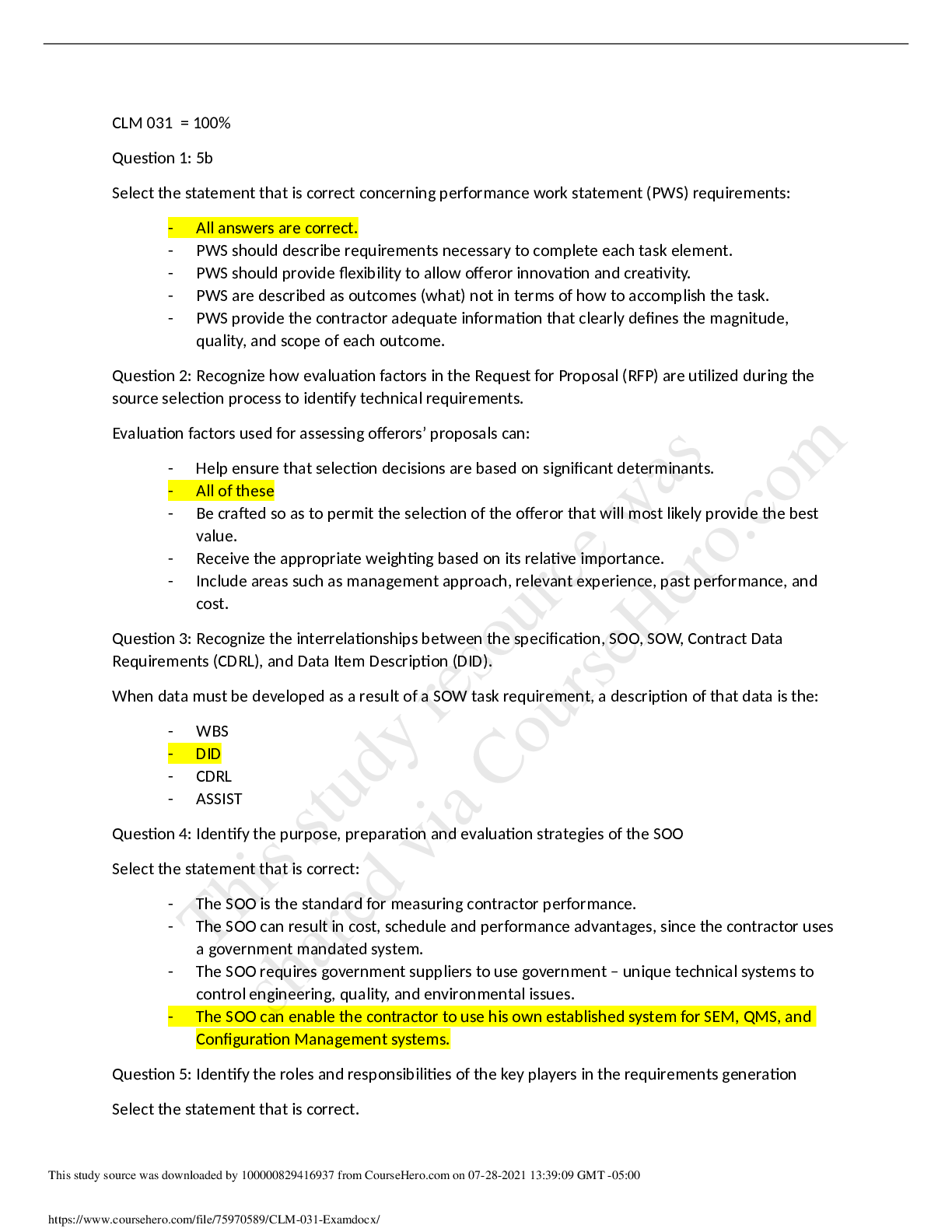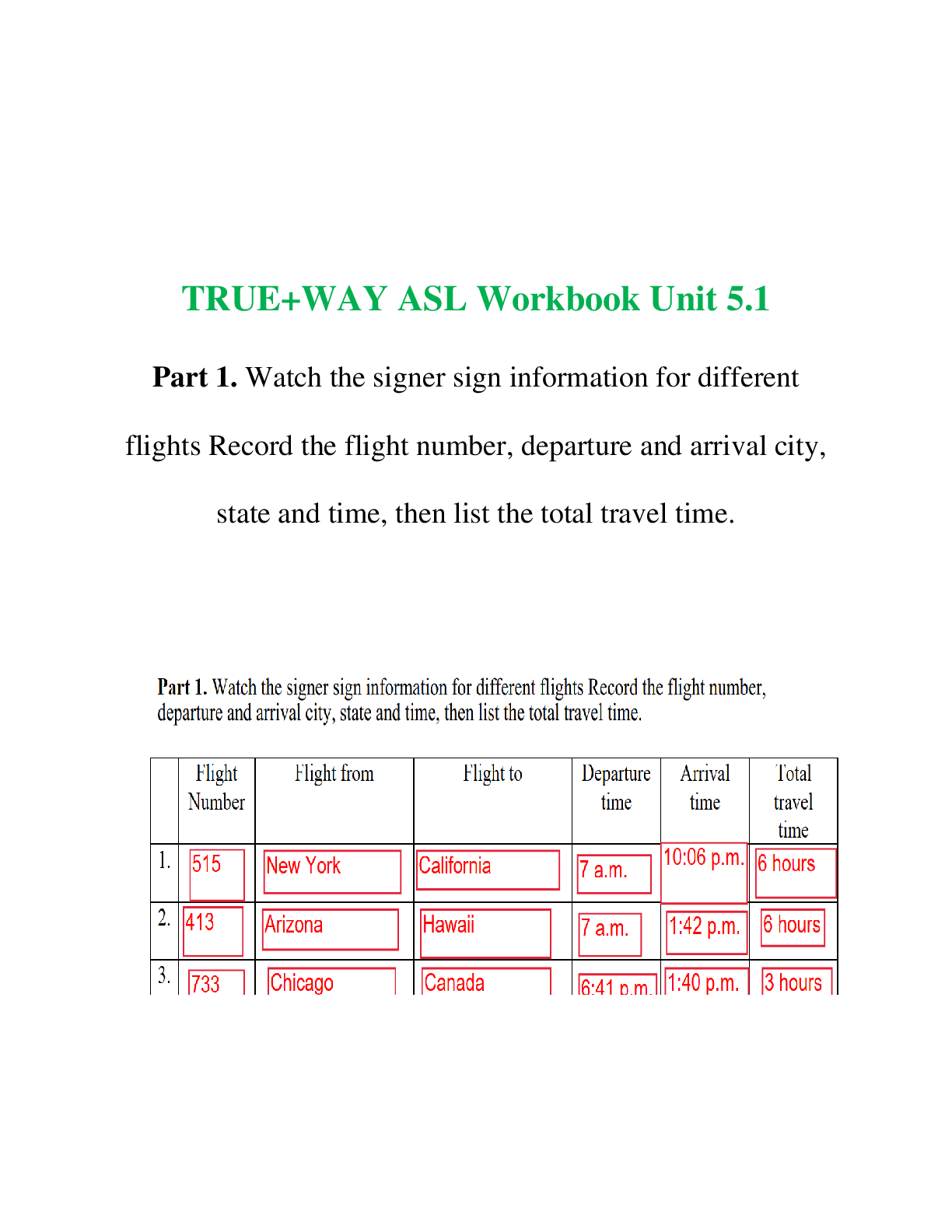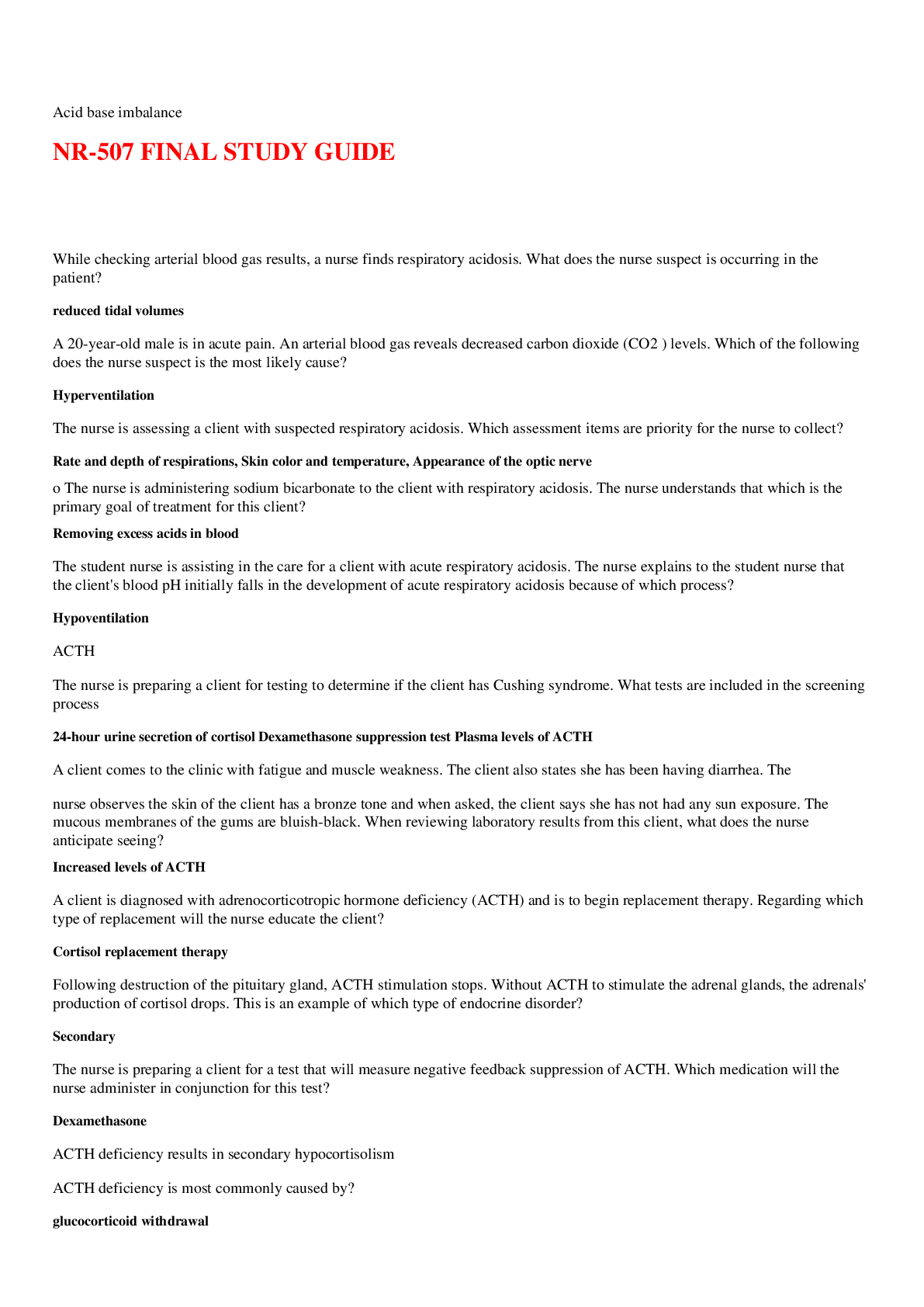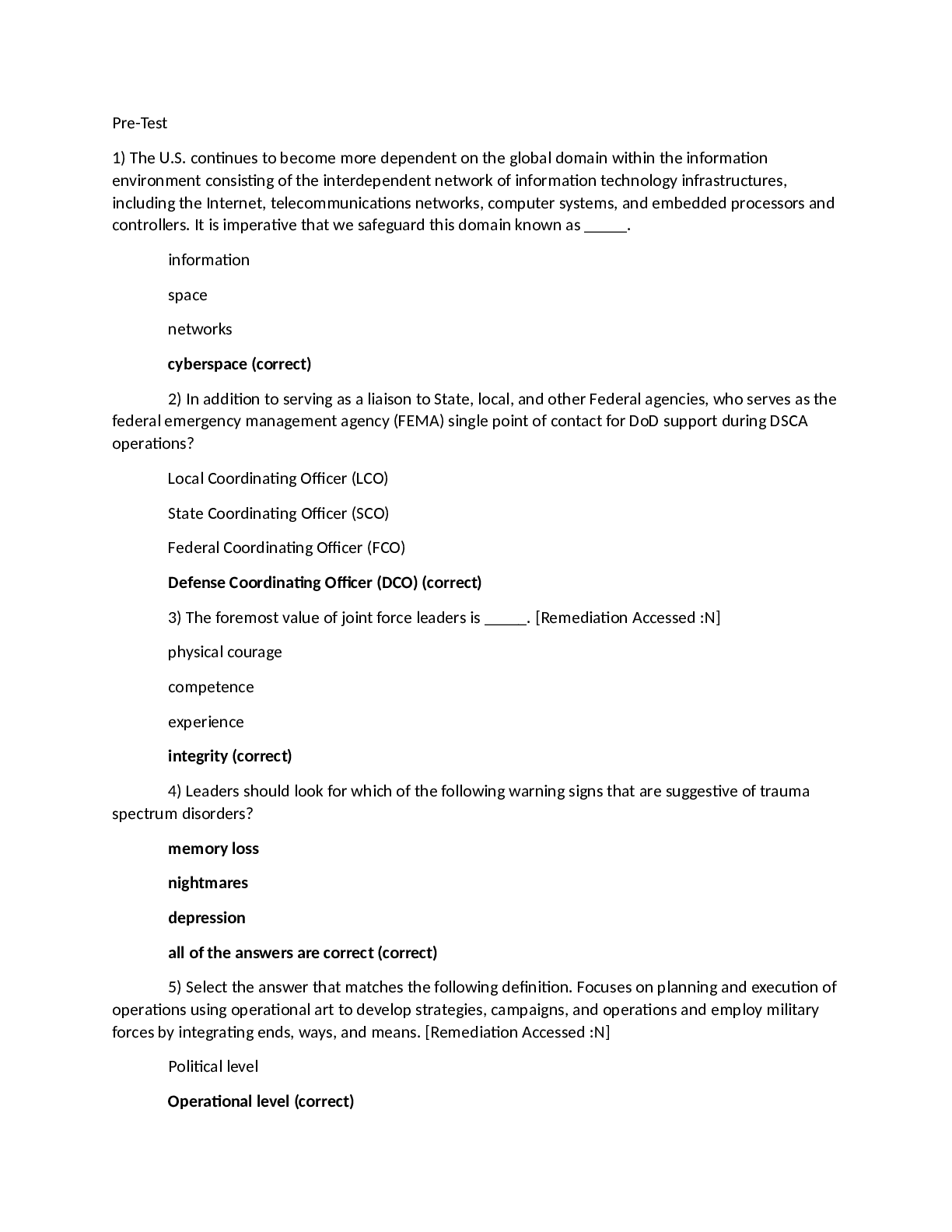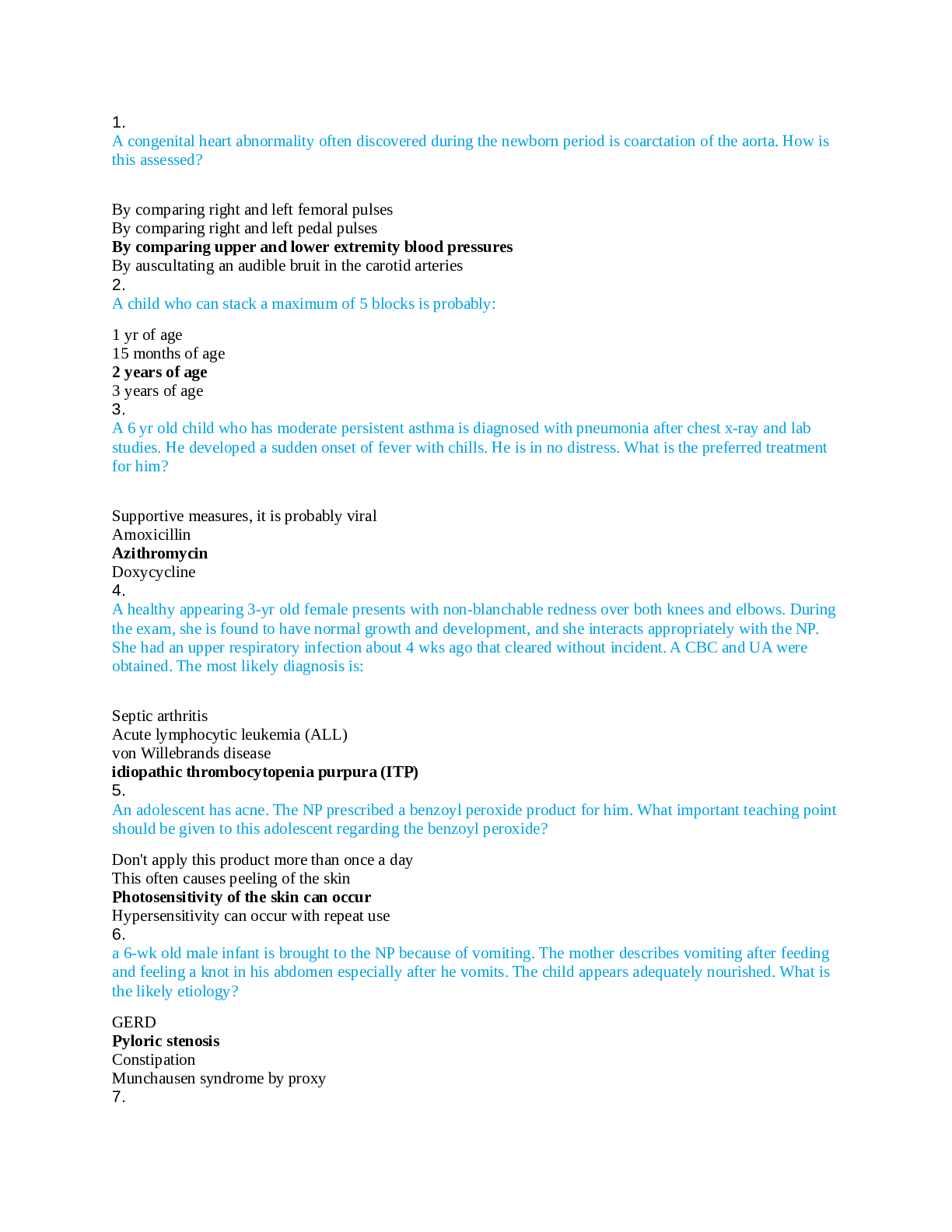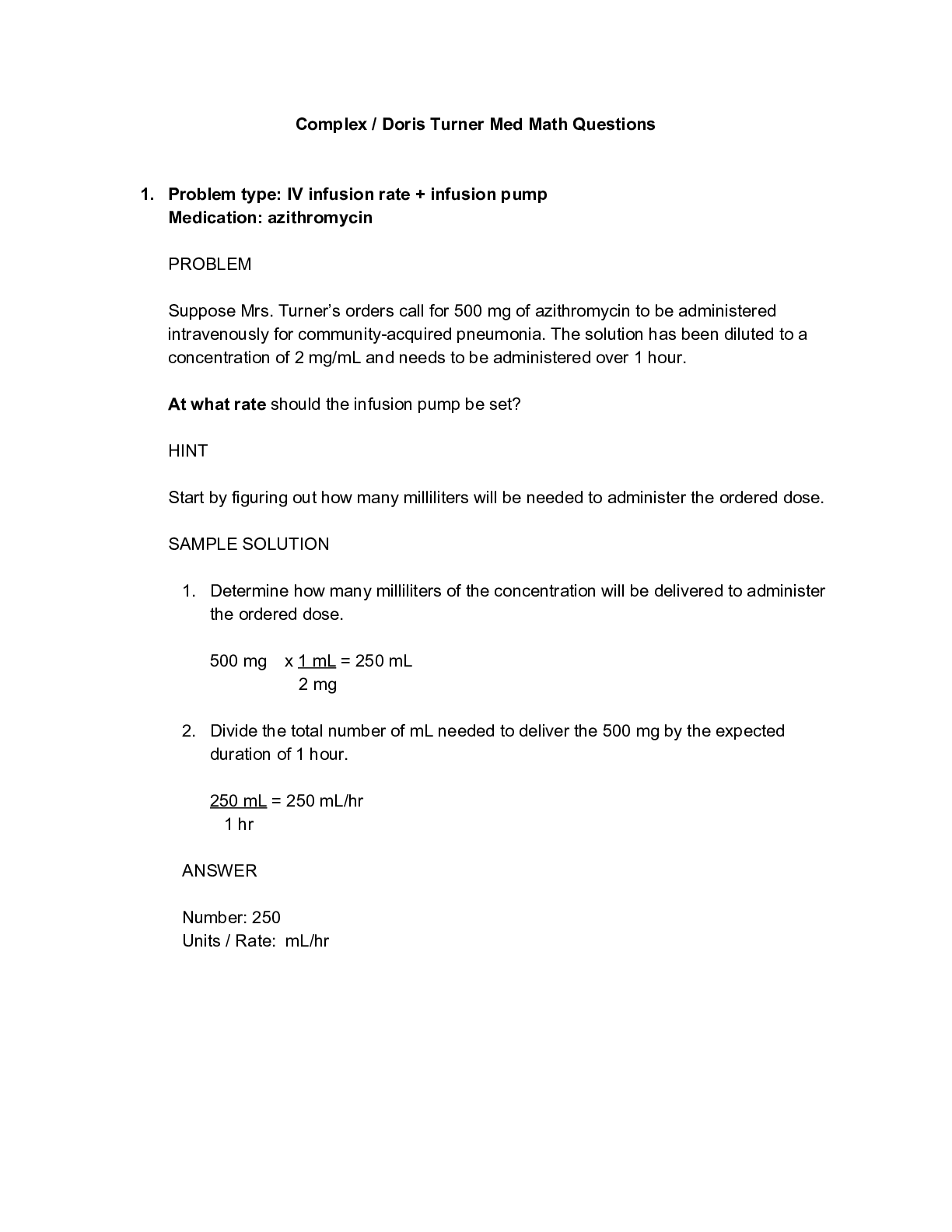Anatomy and Physiology - A&P 2 > QUESTIONS & ANSWERS > BIO202_MH_V3_Topic 10: Water, Electrolyte, and Acid–Base Balance (All)
BIO202_MH_V3_Topic 10: Water, Electrolyte, and Acid–Base Balance
Document Content and Description Below
Page path BIO202_MH_V3 Topic 10: Water, Electrolyte, and Acid–Base Balance Started on Friday, October 22, 2021, 7:19 PM State Finished Completed on Friday, October 22, 2021, 7:54 PM Ti... me taken 34 mins 51 secs Grade 40.00 out of 40.00 (100%) Question 1 Correct 2.00 points out of 2.00 Flag question Question text Ingesting large amounts of sodium bicarbonate can lead to Select one: a. metabolic acidosis. b. metabolic alkalosis. c. respiratory acidosis. d. respiratory alkalosis. e. None of these choices is correct. Question 2 Correct 2.00 points out of 2.00 Flag question Question text Which of the following events occurs last? Select one: a. release of renin by the kidney b. release of aldosterone by the adrenal cortex c. sodium reabsorption by the kidney tubules d. angiotensinogen → angiotensin I e. angiotensin I → angiotensin II Question 3 Correct 2.00 points out of 2.00 Flag question Question text Which of the following people would be most severely affected by prolonged vomiting? Select one: a. 3-year-old male b. 15-year-old male c. 35-year-old male d. 35-year-old female e. 50-year-old male Question 4 Correct 2.00 points out of 2.00 Flag question Question text An increase in blood CO2 levels is followed by a(n) ____ in H+ ions and a(n) ____ in blood pH. Select one: a. decrease, decrease b. decrease, increase c. increase, increase d. increase, decrease e. increase, no change Question 5 Correct 2.00 points out of 2.00 Flag question Question text Bob Trotts has an enteropathogenic E. coli infection resulting in severe diarrhea for 2 days. This could produce which of the following: (1) acidosis (2) alkalosis (3) increased respiration (4) decreased respiration (5) increased ADH secretion (6) increased renin secretion (7) increased urine concentration Select one: a. 1, 3, 5, 6, 7 b. 2, 4, 5, 6, 7 c. 1, 3, 6 d. 2, 4, 5, 7 e. 1, 4, 5, 7 Question 6 Correct 2.00 points out of 2.00 Flag question Question text The sensation of thirst results from Select one: a. an increase in the plasma volume. b. hypertension (increased blood pressure). c. stimulation of osmoreceptor cells in the hypothalamus. d. a decrease in the osmolality of the extracellular fluid. e. inhibition of baroreceptors Question 7 Correct 2.00 points out of 2.00 Flag question Question text Increased osmolality of the ECF Select one: a. increases thirst. b. inhibits ADH. c. increases renin secretion. d. increases aldosterone secretion. e. decreases thirst. Question 8 Correct 2.00 points out of 2.00 Flag question Question text Which of the following substances releases hydrogen ions into a solution? Select one: a. acids b. bases c. salts d. glucose e. water Question 9 Correct 2.00 points out of 2.00 Flag question Question text The major route of excretion for sodium ions (under normal conditions) is the Select one: a. skin. b. kidney. c. GI tract. d. adrenal cortex. e. sweat. Question 10 Correct 2.00 points out of 2.00 Flag question Question text Slight deviations from the normal concentration of ___________ ions can shut down metabolic pathways as well as alter the structure and function of other macromolecules. Select one: a. hydrogen b. potassium c. sodium d. phosphate e. glucose Question 11 Correct 2.00 points out of 2.00 Flag question Question text What cell structure regulates the composition of the intracellular fluid? Select one: a. Plasma membrane b. Cell wall c. Endoplasmic reticulum d. Ribosomes e. Nucleus Question 12 Correct 2.00 points out of 2.00 Flag question Question text In hypocalcemia, Select one: a. depolarization is prevented. b. PTH production is reduced. c. blood calcium levels are increased. d. neuromuscular excitability increases. e. neuromuscular excitability decreases. Question 13 Correct 2.00 points out of 2.00 Flag question Question text Case study: You have just admitted Mary Roberts, a 70-year-old woman, to the hospital for GI bleeding. Her blood pressure is 130/80, pulse 80/min and irregular, respirations 18/min, and temperature 99.2. Mrs. Roberts denies pain at this time although she appears anxious and very pale. Her medical history includes lung cancer that was diagnosed two weeks ago, peptic ulcer disease with reflux esophagitis, and "fluid retention". Admission lab work shows a plasma Na+ of 152 mEq/L and K+ of 2.8 mEq/L. Which of the following regulatory mechanisms would be stimulated as a result of the increased osmolality that results from a Na+ level of 152 mEq/L? Select one: a. increased urine output b. an increased release of ADH c. an increase in renin production d. an increase in the secretion of aldosterone e. a decreased release of ADH Question 14 Correct 2.00 points out of 2.00 Flag question Question text Elevated blood pressure under resting conditions results in increased urinary output because Select one: a. baroreceptors signal the hypothalamus to increase ADH secretion. b. elevated blood pressure stimulates renin secretion. c. the amount of angiotensin II formed is increased. d. aldosterone levels increase. e. baroreceptors signal the hypothalamus to decrease ADH secretion. Question 15 Correct 2.00 points out of 2.00 Flag question Question text As a result of hyperventilation, Select one: a. the body pH decreases. b. the plasma PCO2 level decreases. c. the kidney will increase the rate of hydrogen ion excretion. d. more bicarbonate ions are added to the plasma. e. the plasma PCO2 level increases. Question 16 Correct 2.00 points out of 2.00 Flag question Question text Wetting the oral mucosa and stretching the digestive tract will cause ____________ in thirst sensations. Select one: a. a temporary interruption b. a tremendous increase c. an increase in blood osmolarity and an increase d. an increase in blood osmolarity and a decrease Question 17 Correct 2.00 points out of 2.00 Flag question Question text The main regulator of serum phosphate levels is a transport process in the Select one: a. liver. b. kidneys. c. pancreas. d. small intestine. e. large intestine. Question 18 Correct 2.00 points out of 2.00 Flag question Question text Synovial fluid is a part of which of the following fluid compartments? Select one: a. plasma b. interstitial c. intracellular d. extracellular e. cytoplasm Question 19 Correct 2.00 points out of 2.00 Flag question Question text The distribution of sodium and potassium ions between intracellular and extracellular compartments is Select one: a. potassium mainly intracellular; sodium mainly in extracellular. b. sodium mainly intracellular; potassium mainly in extracellular. c. little of either intracellular but large amounts of both extracellular. d. equal amounts of both ions, in both intracellular and extracellular fluids. e. None of these choices is correct. Question 20 Correct 2.00 points out of 2.00 Flag question Question text Angiotensin II increases blood volume by stimulating Select one: a. thirst. b. vasodilatation. c. water movement into the cells. d. renal excretion of sodium. e. ADH production [Show More]
Last updated: 2 years ago
Preview 1 out of 11 pages
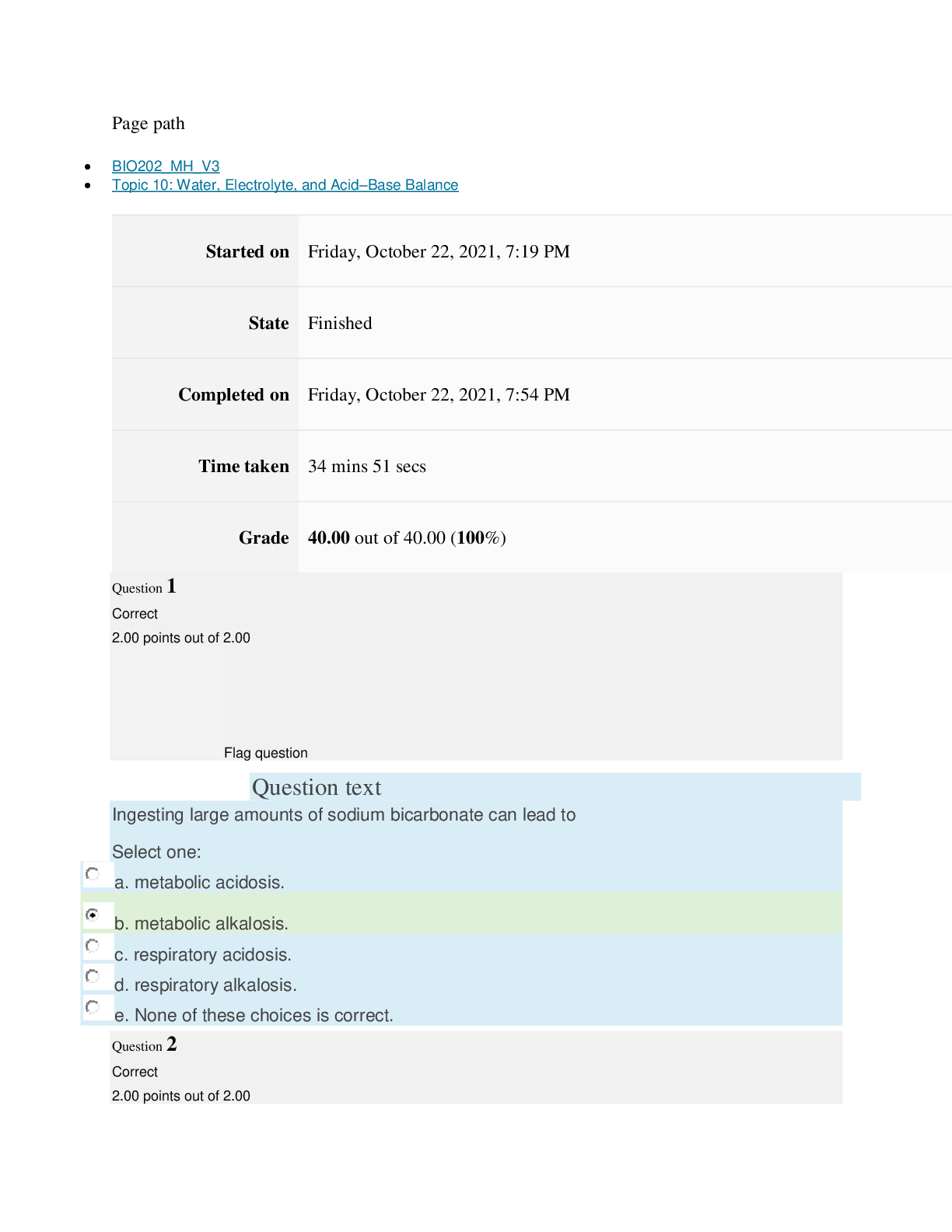
Buy this document to get the full access instantly
Instant Download Access after purchase
Buy NowInstant download
We Accept:

Reviews( 0 )
$7.00
Can't find what you want? Try our AI powered Search
Document information
Connected school, study & course
About the document
Uploaded On
Dec 04, 2022
Number of pages
11
Written in
Additional information
This document has been written for:
Uploaded
Dec 04, 2022
Downloads
0
Views
171



